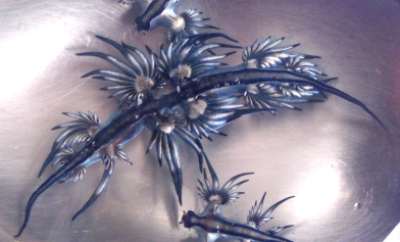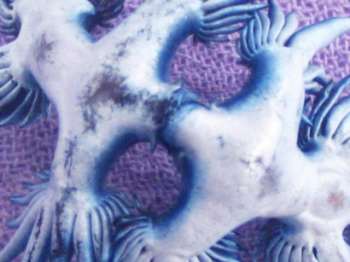What the ?
March 23, 2006
From: Eve Whicker

Hi -
I am very curious about Blue Sea Slug [Glaucus atlanticus] behaviour - - - last weekend we had a huge wash up of Blue Bottle and Slugs on my home beach at New Brighton, just north of Byron Bay. We brought several specimens home to take some photos. Over the course of the afternoon I put them in a container together to get some pix of them en masse and the two largest joined up, rolled over, stayed that way for about 5 minutes then separated with a thingy (?) coming out of their sides. One turned over immediately, the other took a minute or two. I can't imagine that they have a need for male combat but then again who knows ? does any one have a clue ?
Locality: New Brighton Beach, nthn New South Wales, Australia, 18 March 2006. Length: largest 4 cm. Photographer: Eve Whicker.
Eve Whicker
eveii@bigpond.com
Whicker, E., 2006 (Mar 23) What the ? . [Message in] Sea Slug Forum. Australian Museum, Sydney. Available from http://www.seaslugforum.net/find/16154
Dear Eve,
I don't think this is related to sex, I suspect its related to close proximity in a bottle. Although Glaucus usually feeds on Bluebottles it is related to other glaucid aeolids which are quite feisty and are known to attack and eat their own kind. Have a look at the photos of Phidiana hiltoni {message #2716] fighting. Another name for this species, Phidiana pugnax, was given to it because of its pugnacious behaviour. So what I think your two animals are doing is biting each other. I don't know if this is normal behaviour because we don't know much about their normal behaviour. So far no student has been silly enough to float around with Blue bottles and Glaucus to record their behaviour.
Have a look at an earlier message [8233] for a photo of the penis. If that is what you saw, then it is also related to close proximity. Animals which float around in the sea most of the time are probably adapted to mating quite quickly when they 'make contact' with another of their kind. Your lower photo shows the brilliant silvery colour on the back of Glaucus. However as these animals spend their time floating upside down the silvery colour will be on the functional underside of the animal. If you compare this with pelagic fish, such as tuna, you will see a remarkably similar colour pattern - silver below, dark blue above. This is called 'countershading' and helps to render the animals invisble from predators below in the water and above in the sky.
Best wishes,
Bill Rudman
Related messages
-
Glaucus from South Africa
From: Emil H Niksch, May 3, 2010 -
Glaucus atlanticus from Florida
From: Stephanie Armentrout, April 30, 2010 -
Glaucus atlanticus from nthn New South Wales
From: Jayson Dyer, April 23, 2010 -
Re: Glaucus atlanticus from Florida
From: Douglas Hernandez, April 6, 2010 -
Glaucus atlanticus from Florida
From: Emma C., April 5, 2010 -
Blue Bottles and Nudibranch washed up at Kiama, NSW
From: Cherie Noon, March 24, 2010 -
Glaucus atlanticus in Hawaii
From: Aaron Silva, January 29, 2010 -
Glaucus atlanticus find in Northern NSW Australia
From: Matthew Ross, January 20, 2010 -
Glaucus atlanticus from Hawaii
From: Enjoli' Hoskins, September 8, 2009 -
Occurrence of albino Glaucus atlanticus?
From: Evan Orellana, August 31, 2009 -
Glaucus atlanticus from Pacific coast of Panama
From: Clark Misner, May 14, 2009 -
My Glaucus atlanticus Report
From: Kenneth Hattersley, May 14, 2009 -
Glaucus atlanticus in Gulf of Mexico?
From: Kenneth Hattersley, April 7, 2009 -
Re: Tiny, elaborate creature at Stradbroke Island, Queensland
From: Paul Stewart, March 17, 2009 -
Glaucus atlanticus from Kenya
From: Debs North, January 8, 2009 -
Tiny, elaborate creature at Stradbroke Island, Queensland
From: Ken Thomas, December 3, 2007 -
Glaucus atlanticus from Pacific coast of Mexico
From: Joe Weiss, March 7, 2007 -
Sea Lizard [Glaucus atlanticus] from New South Wales
From: Lynne T., March 2, 2007 -
Glaucus atlanticus mating habits
From: Johanna Schwartz, January 29, 2007 -
Glaucus atlanticus in Hawaii
From: Nichol Miura, January 16, 2007 -
What type of Nudibranch is this?
From: Adrian Giles, January 15, 2007 -
Re: Glaucus atlanticus on Gold Coast, Queensland
From: Rob Alesbury, January 15, 2007 -
Glaucus atlanticus on Gold Coast, Queensland
From: John Campbell, December 14, 2006 -
Glaucus eating Porpita in Hawaii
From: Anna-Christina Amason, August 17, 2006 -
Feeding and some trophic interactions of Glaucus atlanticus
From: Irina Roginskaya, August 2, 2006 -
About egg masses of Glaucus atlanticus
From: Irina Roginskaya, May 25, 2006 -
Unknown creature from Fraser Island, Queensland
From: Richard Wilsher, May 9, 2006 -
Some notes about Glaucus atlanticus
From: Irina Roginskaya, May 9, 2006 -
Not sure if this IS a sea slug?
From: Mary Patterson, April 26, 2006 -
Glaucus at Anna Bay, New South Wales
From: Jim Doyle, March 31, 2006 -
Re: Cannibalism in Glaucus?
From: Peter Whiter, March 30, 2006 -
Cannibalism in Glaucus?
From: Peter Whiter, March 28, 2006 -
What is Filurus dubius?
From: Gary Rosenberg, February 24, 2006 -
Glaucus atlanticus - habitat
From: Brandon Pinkney, February 21, 2006 -
Is this a sea slug ??
From: Karen Beal, February 14, 2006 -
Blue Sea slug
From: Liliana Alaniz, February 2, 2006 -
Glaucus atlanticus from the Canary Islands
From: Kim Boettcher, May 23, 2005 -
Information on Glaucus atlanticus
From: Kealy Baker-Clark, April 22, 2005 -
Blue, lizard-like feather-finned tiny animal
From: Paiton Meurer, April 14, 2005 -
Glaucus atlanticus from Reunion Island
From: Philibert Bidgrain, February 19, 2005 -
Found some interesting sea slugs in Florida
From: Sarah McDowell, January 31, 2005 -
Neon Blue sea slug from Fraser Island?
From: Neil Rhodes, January 1, 2005 -
Is this a nudibranch?
From: Scott Godwin, January 21, 2004 -
Glaucus atlanticus from Sth Africa
From: Juleen du Toit, January 21, 2004 -
Glaucus atlanticus from Queensland
From: Nick Falconer , December 3, 2003 -
Glaucus from Wellington Pt, Brisbane
From: Mimi & Phong, November 17, 2003 -
Glaucus in Hawaii
From: Chaunte Ling, May 27, 2003 -
Mysterious blue and white swirley things
From: Sally, April 25, 2003 -
Re: Glaucus in Sydney
From: Alex & Marcus Dawes, March 19, 2003 -
Glaucus in Sydney
From: Alex and Marcus Dawes , March 12, 2003 -
Glaucus atlanticus from Lord Howe Island
From: W.B. Rudman, January 24, 2003 -
Glaucus atlanticus reference
From: Michael Schroedl, November 14, 2002 -
Glaucus atlanticus - observations
From: A. Lovatt., October 21, 2002 -
Thanks
From: Amanda Johnson, June 15, 2002 -
Glaucus atlanticus information
From: Manda, June 6, 2002 -
Re: Collaroy 'Blue Dragon' - thanks
From: Stephen Martin, May 23, 2002 -
Mass of blue dragon(?) nudibranchs
From: Stephen Martin, May 20, 2002 -
Questions about Glaucus
From: Luke Short, April 25, 2002 -
Blue plankton in Uruguay
From: Philip Miller, February 16, 2002 -
Glaucus from Pensacola, Florida
From: Elvira Davis, February 4, 2002 -
Re: Glaucus detecting prey
From: Belinda Biggam, March 18, 2001 -
Glaucus detecting prey
From: Belinda Biggam, March 15, 2001 -
Re: Glaucus
From: Lisa, February 20, 2001 -
Glaucus
From: Chris Parks, August 24, 2000 -
Information on Glaucus atlanticus
From: Angela, August 12, 1999 -
Eggs of Glaucus and Glaucilla
From: Bill Rudman, May 16, 1999 -
Glaucus & Porpita in New Zealand
From: Ross Armstrong, March 31, 1999 -
Re: Glaucus in New Zealand
From: Ross Armstrong, February 26, 1999 -
Glaucus in New Zealand
From: Ross Armstrong, February 25, 1999
